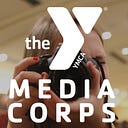Paper With a Personality
By: Audrey Spillman
Business cards are the first impression, the eye-catcher, and the lasting notion of a candidate’s personality and platform. Candidates pour thought and consideration into these cards in order to make themselves stand out and reach a further audience. Due to their simplicity and performance, business cards create their very own back story, some of which bring happiness and foster memories, and others bring frustration and foster deep contemplation. This year’s KUNA candidates have agreed to share these stories with you.
Olivia Raybourne, representing Woodford County, has a business card with an obvious theme: space. Her logo stands as “I was Ray-Bourne to make your KUNA out of this world!” Her older brother, Parker Raybourne also ran for presiding officer and used his name to develop a slogan; Olivia combined her name and her theme of space and equality to create the business card, with the help of a Woodford County Peer, she uses in her campaign now. Her philosophy derived from space is that “we are all equal under the same stars.”
Tristan Black, from Scott County, made a big decision with his cards while helping his friend Sam Smith campaign during KYA. He made the decision to keep his cards sharp, eye-catching, and simple, saying that his design and logo would stick out amongst others and even on the floor. His slogan “never go back” serves as a reminder of his (philosophy) that “we, as youth, can move our world forward and act as a single unit.”
There’s something different about Madi Ortega’s business cards: the sunflowers! They pop off of the page, and they popped out at her last minute. Ortega said that she had been set on a certain card weeks before KUNA, but grew to dislike them and changed them last minute. Sunflowers “represent happiness to me,” she said and they went well with her theme.
Harrison “HB” Bratton’s cards aren’t messing around: it was the intention to make them pop by keeping them short, simple, and straight to the point. He spent time making decisions about them with a fellow (high school person) and settled on a staple green profile card. The simplicity and straightforwardness, he said, will “help get [his] message out.”
The glossy, colorful cards of Minha Ali Raza keep it bright, informative, and friendly. Her design came from Vistaprint, and she says her biggest obstacle was the budget. The color and bright style get her message of equality and justice out.
From Oldham County, Gage Birchmeier’s card also comes from Vistaprint. He says that the template he chose is bold, simple, and supports his platform of work, industrialization, and climate action to stand out and make an impact.
You might have noticed that in all of the shuffling cards, one is radically different. What is this square card, made of 100% recycled and recyclable material? Of course, it’s Sierra O’Brien’s! Her card is professional, colorful, and gives an insight into her life. She says “Everything is colorful in my life,” and she wanted a meaningful, powerful slogan that would draw even more attention to her platform: “Compassion is Common Sense.”
Ari Hansford’s card fashions two different pictures of himself, and he explained that the front represents his professional, level-headed side, and the back exposes a more playful, relatable part of his personality. He did a photoshoot for the card and collaborated with a friend to perfect the design, making it speak to who he is.
The golden, elegant design of Sabrina Jackson’s card announces that she is focused on her platform and her campaign is the foremost of her concerns. Her “magic platforms” work for equality and greatness. She proclaimed during her speech that “You’re not alone, and none of us should ever feel alone.”
Viasia Bramblit’s purple, bold card sports a nifty slogan and an arresting self-created design, “The layout of my card [is] to represent myself.” The card not only speaks her personality and ties into her platform, but it also has a more personal connection to some of her best KUNA memories: “[The] backside of my card shows my happiness when I’m at KUNA. The photo was taken last year when I motivated for a change not only my life but in others when I saw Nathan Zou greet me with kindness without even knowing me.”
You may see a card floating around with a very specific, niche theme: Mean Girls. John Hurley has built his reputation by connecting to deep, nostalgic memories that all of us share, such as early 2000’s movies and TV shows such as Kim Possible, Mean Girls, and everyone’s favorite, High School Musical. As he said in his campaign speech, he’s “never gonna give you up, never gonna let you down…”
Chase Frisby, slam poet star, had two different business cards. One was a classic and straightforward introduction to him and an explanation of his platform. The other, which might spring to mind as easier to remember, was the iconic frisbee itself. This truly unique card stands out for its fantastic shape, its bright color, and the creativity it underlined in its creator. Just like his poetry, Frisby never had trouble mixing things up and keeping KUNA on its toes.
Wyatt Combs, standing on a platform of quality education, zero hunger, and clean water, says on his trifold that “we need to take action.” On rampant and unjust hunger in undeveloped nations, he proclaims “This needs to change.” He is a man of action and frank simplicity, and never shies from the truth. “Education is a need to help improve communities around the world,” Combs says.
The cards each had something unique that spoke to the candidates and portrayed their passions. Finding them at the bottom of a purse, or while you are doing laundry weeks after the conference, serves as a gleeful reminder of the memories made here.
